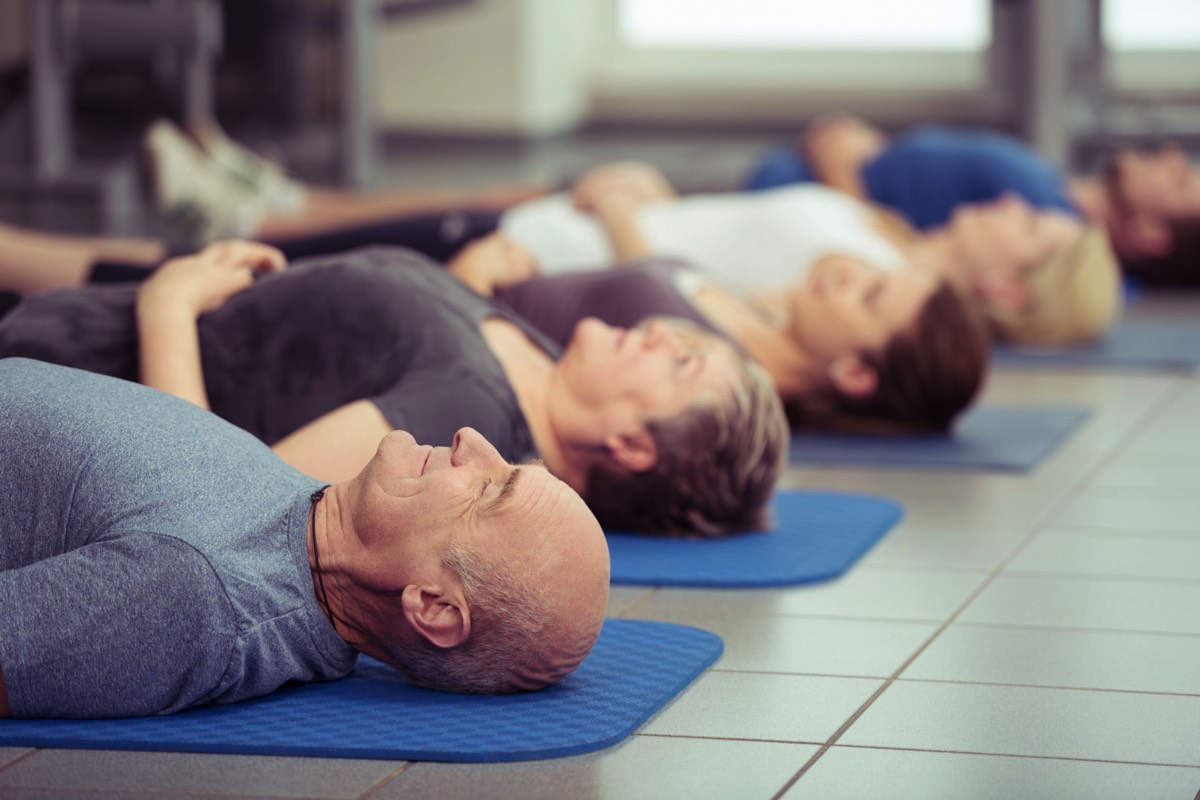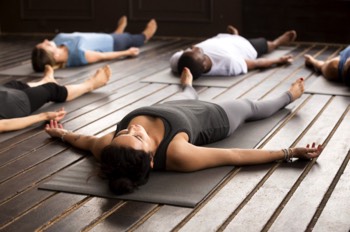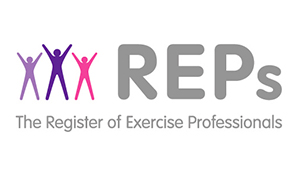It’s Not Just About The Physical Workout

Did you know that one in four adults will experience a mental health problem in any one year. If we look at this in terms of being a Pilates teacher to groups and individuals, if you have a class of 12 people that is potentially 3 people in your class — if you teach 10 classes a week, that is possibly 30 people you see every week who may be struggling with mental health issues. I believe that these figures shouldn’t be ignored by us but that we should look at this opportunity to make a positive impact on those lives.
We all have occasional down days but sometimes those days can turn into longer-term mental health conditions.
We all have occasional down days but sometimes those days can turn into longer-term mental health conditions.
As Pilates teachers we have the skills to recognise this in ourselves and our participants and we can work towards alleviating the effects and factors that can lead to long term illness. Here are some examples of what we can do:
1 Firstly as Pilates teachers we are naturally observant, or we should be! We develop our observation skills as we teach, so use this effectively and observe your class holistically. Look at behaviour of your class participants, their actions and their appearance, before, during and after their session. As a Pilates instructor we tend to build a relationship with our participants so we can monitor changes, they may seem tearful, less motivated, quiet and withdrawn, they may be more irritable, they may start to talk about guilt and feelings of worthlessness. They may also appear to be more tired and lack energy/strength. You may even observe a change in their weight, or they may complain of aches and pains. Basically a quiet word asking how they are, may just be enough to let them know they can come to you, then actively work to maintain that feeling.
2 Secondly we can look at how we can alleviate and protect both ourselves and our class participants. Studies done by the Department of Health and The National Institute for Health and Care Excellence (NICE) have shown that physical activity can reduce the risk of developing depression by up to 30%, and the guidance is participation in low intensity exercise for 45 minutes, 3 times a week to feel the benefits to emotional health. If we are providing group exercises classes we are already supporting positively the national recommendations.
However — There Is More We Can Do
1 Firstly as Pilates teachers we are naturally observant, or we should be! We develop our observation skills as we teach, so use this effectively and observe your class holistically. Look at behaviour of your class participants, their actions and their appearance, before, during and after their session. As a Pilates instructor we tend to build a relationship with our participants so we can monitor changes, they may seem tearful, less motivated, quiet and withdrawn, they may be more irritable, they may start to talk about guilt and feelings of worthlessness. They may also appear to be more tired and lack energy/strength. You may even observe a change in their weight, or they may complain of aches and pains. Basically a quiet word asking how they are, may just be enough to let them know they can come to you, then actively work to maintain that feeling.
2 Secondly we can look at how we can alleviate and protect both ourselves and our class participants. Studies done by the Department of Health and The National Institute for Health and Care Excellence (NICE) have shown that physical activity can reduce the risk of developing depression by up to 30%, and the guidance is participation in low intensity exercise for 45 minutes, 3 times a week to feel the benefits to emotional health. If we are providing group exercises classes we are already supporting positively the national recommendations.
However — There Is More We Can Do
Being happy and healthy in both our personal and professional life needs to be a priority so that the people who attend our classes can see this. Positive energy has an impact on others around you. We all know what it is like when we spend time with people who project their positivity, so we need to recognise that we can do this every time we stand in front of our classes.

Anxiety or depression can be triggered by things that cause worry, panic and nervousness. Changes in class timetables, cancellations, arriving late to teach can lead to participants feeling uneasy and may make them turn away from your class altogether. So try to make it as easy as possible for people to attend your classes. Lists on relevant websites, venue directions on all your correspondence, and try to always be on time.
Regular communication and checking in with class participants will always build confidence in you as an instructor. Participants will feel engaged and will welcome the whole experience you provide. Making yourself accessible and available for a chat, both before and after class, but also online via emails, texts, social media. Always welcome new participants, and always have information that you can share with them. For example — produce a welcome pack which contains the information they need to make them feel part of your group.
Making your classes into friendly, welcoming environments, where people aren’t going to feel judged, but feel safe and feel they have a space to escape. Having fun and creating a feeling of community within the classes is the perfect place for people to feel able to share their problems and their feelings.
Follow a mindful approach to teaching and delivering in class. Think about how you would feel if you were stressed, anxious, worried or lacking in confidence. What would you be looking for in a class. Provide thorough introductions to yourself and your class, continuously encouraging and providing positive feedback throughout the session. Think about the cueing of exercises particularly if they are a bit complicated, providing time for anyone who is new.
Connect mind and body to ensure that your participants are having to think about what they are doing. Co-ordination and motor skills can be tested with movement, and this will provide a challenging workout for both physical and emotional well being. Also remember that the class might be the only opportunity for participants to completion have time for themselves, so time for relaxation and stretching and switching off the mind at the end of the session can be beneficial to relaxing the brain as well as the body.
It isn’t about being perfect, and actually this can lead to feelings of inadequacy and failure in others if this is what we are portraying all the time. So it is time to be honest and open as a role model. Share your imperfections and troubles and any barriers you may have in your life. It provides a realistic image and participants will feel better knowing that actually you are just like them.
Never has it been so important to provide mind/body exercise classes, now is our time to recognise how we can help.
Jane Thomas Pilates
First Class Pilates with Jane Thomas
Regular communication and checking in with class participants will always build confidence in you as an instructor. Participants will feel engaged and will welcome the whole experience you provide. Making yourself accessible and available for a chat, both before and after class, but also online via emails, texts, social media. Always welcome new participants, and always have information that you can share with them. For example — produce a welcome pack which contains the information they need to make them feel part of your group.
Making your classes into friendly, welcoming environments, where people aren’t going to feel judged, but feel safe and feel they have a space to escape. Having fun and creating a feeling of community within the classes is the perfect place for people to feel able to share their problems and their feelings.
Follow a mindful approach to teaching and delivering in class. Think about how you would feel if you were stressed, anxious, worried or lacking in confidence. What would you be looking for in a class. Provide thorough introductions to yourself and your class, continuously encouraging and providing positive feedback throughout the session. Think about the cueing of exercises particularly if they are a bit complicated, providing time for anyone who is new.
Connect mind and body to ensure that your participants are having to think about what they are doing. Co-ordination and motor skills can be tested with movement, and this will provide a challenging workout for both physical and emotional well being. Also remember that the class might be the only opportunity for participants to completion have time for themselves, so time for relaxation and stretching and switching off the mind at the end of the session can be beneficial to relaxing the brain as well as the body.
It isn’t about being perfect, and actually this can lead to feelings of inadequacy and failure in others if this is what we are portraying all the time. So it is time to be honest and open as a role model. Share your imperfections and troubles and any barriers you may have in your life. It provides a realistic image and participants will feel better knowing that actually you are just like them.
Never has it been so important to provide mind/body exercise classes, now is our time to recognise how we can help.
Jane Thomas Pilates
First Class Pilates with Jane Thomas
First Class Pilates — Pilates Done Right!





First Class Pilates — 9 Great Central Road — Loughborough — LE11 1RW